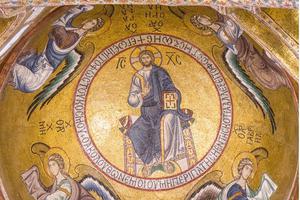Today the Church Celebrates the Most Holy Name of Jesus
The beginnings of the veneration of the Most Holy Name of Jesus date back to the liturgical celebrations of the 14th century.

Every Jan. 3, the Church celebrates the Most Holy Name of Jesus.
“This is that most holy name longed for by the patriarchs, anxiously awaited, called upon amid cries of suffering, invoked with sighs, implored with tears, given when the fullness of grace arrives” (St. Bernardine of Siena).
The Lord’s name
The name “Jesus” comes from the Latin form of the Greek “Iesous” (Ἰησοῦς), which in turn is the transliteration of the Hebrew “Yeshua” (Yehošuaʕ) or “Yehoshua” (Yehošuaʕ) or, in its contracted form, “Joshua,” which means “Yahweh is salvation.”
The beginnings of the veneration of the Most Holy Name of Jesus date back to the liturgical celebrations of the 14th century. St. Bernardine of Siena in the 15th century, along with his disciples, spread the veneration of the Name of Jesus and a century later, around 1530, Pope Clement VII granted the Franciscan order authorization for the celebration of the Office of the Holy Name of Jesus.
IHS
St. Bernardine used to carry a wooden placard showing the Eucharist surrounded by rays with the monogram “IHS,” an abbreviation of the Name of Jesus in Greek (Ἰησοῦς). Later, the devotional tradition added a new meaning to this monogram, turning it into a Latin “Christogram”: “I” for “Iesus” (Jesus); “H” for “Hominum” (of men); “S” for “salvator” (Savior). That is, IHS means “Jesus, Savior of men.” New meanings would be added later.
St. Ignatius of Loyola and the Jesuits made this monogram the emblem of the Society of Jesus.
Spiritual aids
Invoking the holy name of Jesus with faith “brings help in bodily needs, according to the promise of Christ: ‘In my name they shall take up serpents; and if they shall drink any deadly thing, it shall not hurt them: they shall lay their hands upon the sick, and they shall recover’ (Mark 16:17-18). In the name of Jesus, the Apostles gave strength to the lame (Acts 3:6; 9:34) and life to the dead (Acts 9:40).
“It gives consolation in spiritual trials. The name of Jesus reminds the sinner of the prodigal son’s father and of the good Samaritan; it recalls to the just the suffering and death of the innocent Lamb of God.
“It protects us against Satan and his wiles, for the devil fears the name of Jesus, who has conquered him on the cross.
“In the name of Jesus we obtain every blessing and grace for time and eternity, for Christ has said: ‘If you ask the Father anything in my name he will give it to you’ (John 16:23). Therefore the Church concludes all her prayers by the words: ‘Through Our Lord Jesus Christ,’ etc.” (Catholic Encyclopedia)
Thus are St. Paul’s words fulfilled that “at the name of Jesus every knee should bend, of those in heaven and on earth and under the earth,” (Phil 2:10).
This story was first published by ACI Prensa, CNA’s Spanish-language news partner. It has been translated and adapted by CNA.
- Keywords:
- holy name of jesus














